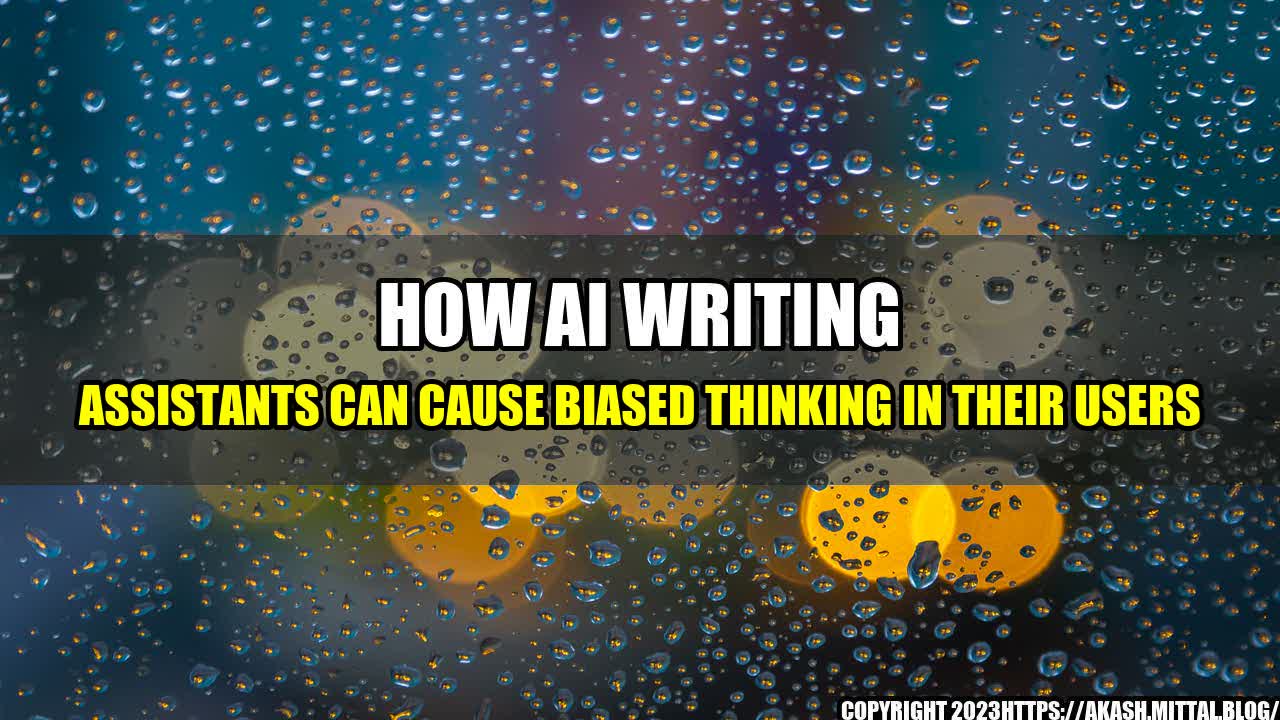Have you ever used an AI writing assistant such as Grammarly or Google Docs' Smart Compose? While these tools can be incredibly helpful in improving your writing skills and productivity, they may also be causing you to develop biased thinking without even realizing it.
Take for instance the case of Sarah, a publishing intern who was tasked with writing a book review for a new release. As she was writing, Grammarly flagged the word "hysterical" as an error and suggested replacing it with "funny" or "humorous". Sarah instinctively took the suggestion and continued with her review. However, when her boss read the final draft, she pointed out that the word "hysterical" was actually a more fitting and nuanced description of the book's tone. Sarah had inadvertently sterilized her writing due to the over-reliance on a writing assistant.
This is just one example of how AI writing assistants can cause biased thinking in their users. While these tools may seem like neutral helpers who simply provide suggestions for improvement, they are actually programmed with certain biases that can influence the way we write and think. In this article, we will explore how this happens and what we can do to prevent it.
Examples of Biased AI Writing Assistants
Let's start with some quantifiable examples of how AI writing assistants can cause biased thinking in their users:
- Gender Bias: A study by researchers at McMaster University found that AI algorithms commonly used in text analysis, including writing assistants, tend to associate female pronouns with the arts and humanities, while male pronouns are linked with math and science. This reinforces harmful gender stereotypes and can lead to skewed perceptions of gender roles in society.
- Racial Bias: A study published in the journal Science found that AI language models trained on large datasets often reflect the biases of those datasets, including racial biases. This can lead to inaccurate or offensive language suggestions, as well as perpetuate stereotypes about certain communities.
- Cultural Bias: AI writing assistants are often developed by tech companies based in Western countries, leading to a bias towards Western cultural norms and values. This can lead to awkward or inappropriate language suggestions for users from other cultures, as well as perpetuate stereotypes about non-Western perspectives.
How AI Writing Assistants Cause Biased Thinking
Now that we've seen some examples of how AI writing assistants can cause biased thinking, let's explore why this happens:
- Programming: AI writing assistants are developed by teams of programmers who inevitably bring their own biases and assumptions to the table. These biases may be conscious or unconscious, but they are always present in the algorithms and models used by the AI writing assistants.
- Data Sets: AI writing assistants are trained on large datasets of text, which may be biased in themselves. If the dataset includes more writing from male authors, for example, the AI writing assistant will be more likely to suggest language that reflects male perspectives.
- User Feedback: AI writing assistants are designed to learn from user feedback, which can lead to a feedback loop of biases. If users consistently choose suggestions that reflect a certain bias, such as gender or racial biases, the AI writing assistant will learn to reinforce that bias in its suggestions.
Preventing Biased Thinking with AI Writing Assistants
So what can we do to prevent biased thinking when using AI writing assistants?
- Critically evaluate suggestions: Before accepting a suggestion from an AI writing assistant, take a moment to evaluate it critically. Does it reflect your own perspective, or does it perpetuate harmful stereotypes or biases?
- Diversify your feedback: Instead of relying solely on one AI writing assistant, try using multiple tools from different companies. This will expose you to different perspectives and reduce the risk of developing biases from a single tool.
- Be aware of your own biases: Finally, it's important to be aware of your own biases and assumptions when using AI writing assistants. If you notice that you consistently accept suggestions that reflect a certain bias, take a step back and evaluate why that might be.
Conclusion
In conclusion, AI writing assistants can be incredibly helpful tools for improving our writing skills and productivity. However, we must also be aware of the ways in which they can cause biased thinking and perpetuate harmful stereotypes. By critically evaluating suggestions, diversifying our feedback, and being aware of our own biases, we can prevent these tools from leading us down a biased path.

Curated by Team Akash.Mittal.Blog
Share on Twitter Share on LinkedIn